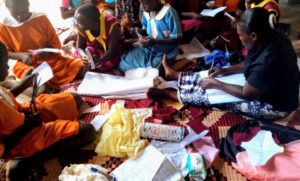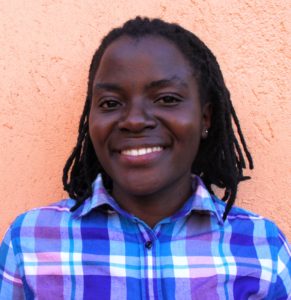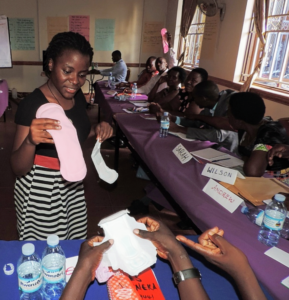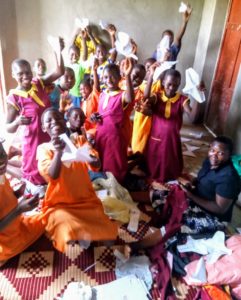
It has often been said that if you educate a girl, you educate a nation. The statement is hardly disputable, as girls with at least some formal education are statistically more likely than their uneducated counterparts to marry later, have healthier families and better maternal nutrition practices, participate in the labor market and increase their income, and ultimately educate their own children better and contribute to positive economic growth and transformation in their communities.
When a girl fails to get an education, therefore, it is an issue that not only affects her well-being, but those around her as well—her family, her future family, her community, and her nation. So special attention should be paid to why this failure occurs.
One of the issues affecting girls’ ability to acquire an education in the developing world, but particularly in Uganda, is a natural process of the human body with unnaturally high consequences for continuing education—menstruation. Girls in Uganda miss up to eight days of school each school term due to their periods, and it is an absence rate that is hard to make up for in terms of assignments and lessons skipped. For some girls, the problem goes beyond absenteeism and leads to completely dropping out of school, contributing to national statistics that show just 22% of girls enrolled in secondary education compared with 91% in primary schools.
Part of the problem is infrastructural and resource-related, with many schools lacking washrooms, clean water, and effective sanitary pads for girls to properly manage their periods. But part of the problem is also attitudinal, as even acknowledging and discussing the topic is still considered a taboo in most parts of Uganda.

Angella Ssanyu is an outgoing Building Tomorrow Fellow from our second cohort.
Angella Ssanyu, a Building Tomorrow Fellow from our second cohort, is tackling the issue on both resource and attitudinal fronts with her social enterprise, Wings of Hope. By teaching girls how to make reusable sanitary pads and bringing both males and females on board through her Brighter Days for Girls initiative in the four schools at which she works, Angella is challenging norms to address this critical challenge facing Uganda’s students.
“We are living in a society where people think menstruation is a taboo,” Angella explains. “They think girls are supposed to discuss it with females only, which is not the case. Because when there is silence about it and nobody is talking about it, we cannot promote proper menstrual hygiene management.”
Angella’s decision to take action through her social enterprise was sparked through health talks with boys and girls in her communities. During a discussion one afternoon about menstrual hygiene, it became apparent that most of the students did not know what an ordinary sanitary pad looked like, as most were using other materials like leaves, toilet paper, and cloths. Amongst the 30 girls present that day, Angella recalls, only five had ever seen a sanitary pad, and only two had ever used one. Touched by this realization, Angella started asking what she could do about the situation. While her thoughts ran the gamut from looking for organizations to provide pads, providing them herself, or raising school fees so that the school could provide them, she eventually came up with a solution where sustainability, community mobilization, and sensitization were at the fore.
Step one for Angella was raising awareness about proper menstrual hygiene management through her Break the Silence about Menstrual Hygiene Campaign, starting with the Nawankofu Building Tomorrow Academy, one of the four schools at which she works. She chose to start her awareness efforts with the school management committee and parent-teacher association because most of the members are male, and she wanted to integrate them into the conversation.
“In town, it’s a bit fair,” Angella explains. “But when it comes to villages, certain things are very sensitive, whereby a girl cannot even tell her father that she needs pads. It’s like a shaming. You’re supposed to only tell females. So during one of the meetings, I talked about it and told them, ‘This is not a taboo. Let’s work together. When I want to hold a meeting about menstrual hygiene management in the community, please support me.’”

At a workshop for head teachers, Angella shows the differences between her reusable sanitary pad prototype and traditional non-reusable pads.
While at first the men felt shy about it, some of them welcomed the idea and, with the support and positivity of the head teacher, Angella was able to successfully start holding meetings in her community with both boys and girls to combat the stigma and bullying often associated with menstruation. She has now successfully built a network to support girls with these challenges. “I tried to look at something that would be sustainable,” Angella describes. “So I work with senior women teachers and senior male teachers to empower them so that even if I am not around, when a girl meets a problem [with menstruation], they are approachable and can help.”
However, Angella did not stop there. She is also addressing the challenges of accessing proper sanitary materials in her resource-constrained rural communities through her Brighter Days for Girls initiative, which empowers girls to make their own reusable sanitary pads. Purchasing needles, thread, rolls of polythene paper, and flannel material with her own money, Angella started a prototype of her reusable sanitary pads, and then moved forward to teach 30 young girls how to trace, cut, and knit the reusable pads by hand, alongside discussions on proper menstrual hygiene management with both the girls and their parents. From these 30 girls, Angella has now selected the 20 most skilled girls and plans to take the next step of buying sewing machines soon so that the group can more efficiently sew, pack, and distribute the pads to other schools, hospitals, and communities at a more affordable rate than what is currently on the market. She plans to sell the finished product of 3 packaged pads at a price 8,000 UGX, as opposed to the current and most prevalent So Sure brand of reusable pads currently on the market for 7,500 UGX for just 2 pads.

Girls at the Nawankofu Building Tomorrow Academy display the materials used to make the reusable sanitary pads, including the stencils used to trace the shapes of the sanitary pads on cloth. Each pad takes about 20-30 minutes to complete.
The price point, Angella says, is very important because the communities in which she works do not have much money. “If they cannot even pay 5,000 UGX for a kid to take porridge at school, then they cannot afford sanitary pads.”
The reusable pads, however, represent a cost-effective solution for parents, especially those who cannot afford the currently available non-reusable options on the market. Walking through the calculations, Angella estimates that a girl who hoped to manage her period using non-reusable pads currently on the Uganda market like the Always brand (currently at 3,500 UGX for a 7-pack) would spend almost 84,000 UGX annually just managing her period. If a family has more than one girl, which is common in Uganda where families tend to be larger, then you would have to multiply this cost for each child. The price is simply out of reach, and it is often more affordable for a family to just allow a girl to miss school. The reusable pads, in contrast, each last about 6 months and represent a real solution for parents wanting to provide such materials to their daughters and support them in their education.
Moving forward, Angella hopes to grow her social enterprise and redesign her product with more natural materials, potentially using things like sugarcane husks or banana fibers to bring down costs even further. In the meantime, however, Angella and Wings of Hope continue to develop affordable, sustainable solutions to menstrual hygiene management, one stitch at a time.
“In Uganda,” Angella says, “menstruating is termed as ‘falling sick’ in most of the local languages. And I keep telling them: If you don’t ‘fall sick,’ then you are sick.”
Building Tomorrow is proud of the work that Angella Ssanyu is doing in her communities to break the silence on menstrual hygiene management and provide affordable and sustainable solutions to resource-constrained Ugandans. We continue to support such innovative efforts to improve girls’ access to education through our Fellows Program, as well as through gender-conscious infrastructural investments and best practices at our schools, including gender-segregated latrines and improved water, sanitation, and hygiene (WASH) initiatives.

Follow Us on Social Media